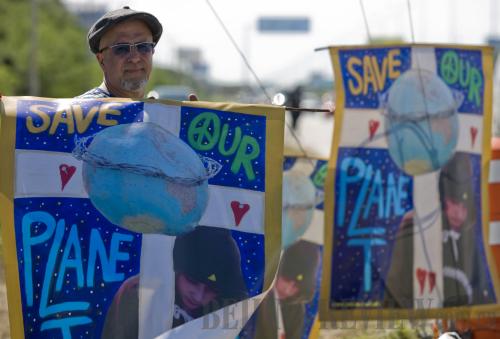|
 |
|
SAVE THE GLOBE: Demonstrators outside the Cancun Conference on November 29 show concern for the future of the planet (XINHUA) |
Participants at the UN Climate Change Confe-rence in Cancun from November 29 to December 11 didn't reach an agreement until the last minute. The agreement was a small yet meaningful step in the international climate change negotiation process.
Developed countries promised to offer financial support to developing countries to control deforestation. A Green Climate Fund will be established. The plan calls for 37 developed countries to offer $100 billion annually until 2020 to help developing countries cope with climate change and realize green development. A low-carbon technology transfer system will also be established to satisfy the technology demands of developing countries.
The Cancun agreement did not satisfy all critics, but it is still extremely significant. It provided a formal recognition of this year's progress in climate change negotiations and established a basis for future discussions.
The agreement had the support of more than 190 countries, and it countered the common belief that multilateral UN climate change negotiations don't function well. By sustaining an atmosphere of international cooperation, it reversed the trend of weakening mutual trust that has existed since the Copenhagen climate change conference last year. It also sent a clear market signal, encouraging investors to focus on green technologies. In addition, the agreement promoted the willingness of developed countries to improve their emission reduction promises and goals.
Whether or not the Kyoto Protocol should continue to exist became a main focus of the conference. Japan and Russia first announced that they would not make quantitative emission reduction commitments for a second period. The United States and Canada maintained their stances and echoed Japan and Russia. The Kyoto Protocol is in now jeopardy, but it is the only legally binding document on addressing climate change and it should serve as the yardstick for global climate cooperation. It provides a condensed version of the past decade's progress in international climate talks, and can be a link between past and future climate cooperation. Abandoning the protocol after its first commitment period expires in 2012 would mean a total denial of the double-track negotiation mechanism, the Bali Road Map, and the principle of "common but differentiated responsibilities" under the UN Framework Convention on Climate Change (UNFCCC). Then, the international climate cooperation process would be forced to return to the starting line.
The Cancun conference was just a stepping-stone in the entire international climate cooperation process. In the Cancun agreement, there are many issues that must be addressed through further consultation and negotiation. For instance, where will the financial support to assist developing countries in preventing deforestation come from? How will the Green Climate Fund be established, managed and distributed? How will the fast-start funding, which developed countries promised in the Copenhagen Accord, be connected with the relative stipulations in the Cancun agreement? And how can a technology transfer mechanism operate effectively? It will be extremely difficult to put the Cancun agreement into practice.
During the conference, negotiators dodged the most sensitive issues in order to reach an agreement. They were also vague about the future prospects for the Kyoto Protocol and about transparency issues, like "measurable, reportable and verifiable" emission reduction. But differences between developed countries and developing ones—especially emerging economies like China and India—remain.
Developed countries have attempted to force developing nations to take equal responsibilities, despite vast differences in economic and social development. They have also required the establishment of an international monitoring system as a watchdog of developing countries' self-determined emission reduction efforts. The United States even suggested offering financial assistance to the least developed countries if they agree to join the system in an attempt to split developing countries.
Given the die-hard attitude of developed countries, negotiators had to turn their focus to sustaining confidence in UN multilateral negotiations, rather than a second commitment period at the Cancun conference. As they tried to cement a basis for next year's UN Climate Change Conference in Durban, South Africa, they refrained from addressing previously shelved issues. As a result, these issues will be relayed to Durban from Copenhagen and Cancun.
The international environment for climate talks has become more uncertain. Since the financial crisis, many developed countries have placed economic recovery as their top task. Caring less about climate change, they have cut off budgets that support the development of renewable energy. Their legislation efforts have also met with resistance. On the contrary, emerging economies have better economic situations, which trigger a sense of crisis and anxiety in developed countries. Developed nations intend to transfer emission reduction burdens to emerging nations, so as to limit their development ability. Under pressure from the developed world, more differences have appeared among developing countries.
Coping with climate change is an unavoidable global issue. But it will be difficult to realize effective international cooperation in a short time. According to the International Energy Agency, global primary energy demands—mainly fossil fuels—will increase by at least 30 percent in the next 25 years, even if current climate policy goals are realized. Therefore, differences among main negotiators remain difficult to overcome. The world is marching closer and closer to a new agreement that can address most concerns, but the journey will be a difficult one.
The author is deputy director of the Department for World Economy and Development of the China Institute of Cancun
| 